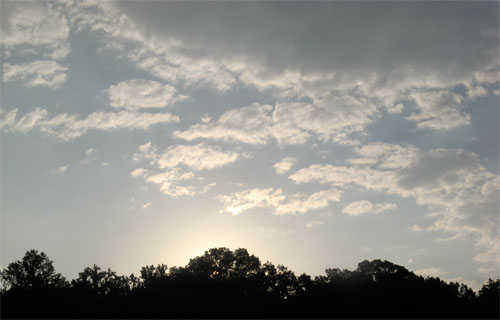Yesterday I had it in my head that “mindfulness” — just existing in the now, mentally — was a great way to get your head in the game, hike-wise. It worked wonders in 30-second bursts: There’s nothing like emptying the mind and letting the forest pour in.

This morning I wondered what would happen if I tried getting mindful for longer stretches, like several minutes at a time. Within a quarter-mile it dawned on me that what works in a gym or a yoga studio has to be adapted to the realities of the wilderness. Living in the now for more than a minute or two created a sensory overload that almost made me dizzy. I wouldn’t call it fun.
My equilibrium returned when I focused my attention on the trail ahead and made a concerted effort not to dwell on anything outside my immediate experience. The take-away is that being now-centric is all well and good if you’re standing still, but if you’re moving, your brain’ll freak out if you’re not looking at least a few steps into the future.
So what’s the payoff for all this mental mumbo-jumbo? An easy example practically jumped in front of me. I was doing my tune-out-all-the-external-BS exercise when I heard a rushed rumbling through woods just down the trail. Probably a deer, I figured, but I didn’t see anything.
I turned a curve, walked about 20 feet and there the deer was, frozen in a stance about 20 feet from me. Ridiculously close for wildlife, but this is a suburban park and the deer are very tame. If I hadn’t had my radar tuned, I’d have walked right past him.
Maybe this is no more complicated than teaching yourself to pay attention. For years the simple act of walking down the trail has been enough; if I saw something cool I’d take a picture and post it on the blog.
Tuning out all the nonsense and tuning in my outdoor brain doesn’t come naturally. I bring all my baggage along, and many a hike has been poisoned by ruminations over the injustices big and small that define urban life.
Well, there’s no injustice in nature. There are laws, and some species like ours are luckier than others in the short run, but nature’s rule always prevails. That’s the appeal of being out there in a place where everything makes sense and fits into a logical scheme.
Our brains were built to abide by nature’s laws, and getting “back to nature” is really just getting our brains back where they belong.
Related: Mindful hiking: going with the flow

Oh that we could all learn to slow down and pay attention to the beauty around us. The speed is understandable in our busy lives, but when in nature, hiking? Let’s learn to slow it down!
Bernice
The first steps towards a dream
I always wonder why so many hikers walk so fast, like they’re trying to get it over with or something.
I’ve been reassured this is just their natural pace.
I’ve never understood the whole speed hike thing either Tom. I mean if the person is trying to get more fit than normal hiking allows or they are just out there for exercise and nothing more then I understand, however they really have no clue what they are missing. We did two 6+ mile hikes over the weekend and both of them took us over 5 hours. Probably a little fast for some but too slow for most others. 😛
My biggest reason for regular hiking is the fact that getting out on the trails is the best way that I know of to get out from under the cultural, sensory, and literal pollution of living in a modern American city. It doesn’t take substances, or gurus, or fantasy to free your mind. Those things are only distractions. You begin being free the moment you begin you discover the inescapable conclusion that you are in fact, a natural being within the whole universe, and begin to tune in the living spectrum of the natural world.
I enjoy your blog, and wanted to thank you in particular for these last few columns on mindful hiking. I went out for a hike a couple of weeks ago, and when I started I thought, “Gosh, I have a lot of noise in my head today.” Two hours later, as I finished up the hike, I realized that the clutter was gone — I was breathing more slowly, my body felt more relaxed…I hadn’t been trying to feel better over the course of the hike; it just happened.
Thanks for your thoughtful posts and your helpful Web site.
This Sierra Club article offers a great perspective on stillness, motion, and mindfulness in the wilderness.
Hiking meditation has always been important to me, but like the body my mind seems to require rest between efforts. I would love for a present mind to come effortlessly, but not yet 🙂